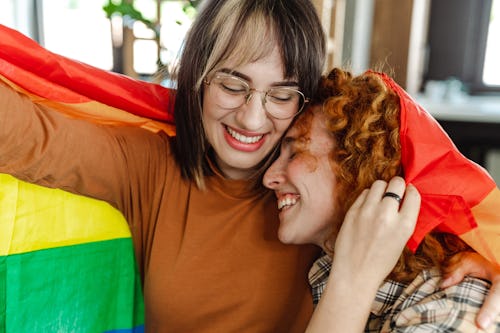
Forty-nine U.S. states and territories have hate crime laws, but like everything else in America those laws were not all created equal. There are still 27 states where gender and sexual minorities are not protected from discrimination in employment, housing, and public accommodations. Now, a new study suggests that hate crime laws may protect teens in an unexpected way: suicide rates.
The study, which was published Thursday in Psychology, Public Policy, and Law, analyzed the rates of suicide attempts among youths in states with hate crime laws that protect LGBTQ+ people, comparing the numbers before and after hate crime legislation was passed. What researchers found was that after hate crime laws that protect queer youths were passed, suicide rates dropped by 16% — not just for queer teens, but for all youths in grades 9-12. There was no drop in suicide rates in states with more general hate crime laws, according to the study.
The data is illuminating in that it demonstrates hate crime laws don’t just protect queer folks, but everyone. In fact, researchers found that there was no demonstrable difference in the drop in suicide rates for queer youths when compared to their cis-het counterparts. Scientists call this effect “social spillover.”
“Multiple studies have illustrated this general effect, which we conceptualized as evidence of ‘social spillover,’” Aaron Kivisto, professor of clinical psychology at the University of Indianapolis and an author of the study, told EurekAlert. “This essentially says that just as factors that contribute to health disparities are ultimately disadvantageous for all, factors that remedy health disparities are frequently beneficial for all.”
In case you weren’t aware, LGBTQ+ youths have nearly double the risk of suicide than other teens. This research shows that creating laws that specifically protect those at-risk, though, is good for everyone. “Hate crime laws are associated with reductions in the proportion of adolescents who attempt suicide, but this potential appears to be contingent on naming sexual minorities as a protected group,” Kivisto told EurekAlert. This, to me, is clear proof that the old adage “none are safe until all are safe” holds true and that making the world safer for the most vulnerable really does make the world safer for everyone.







